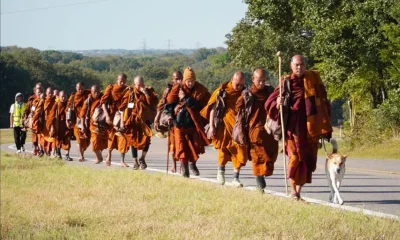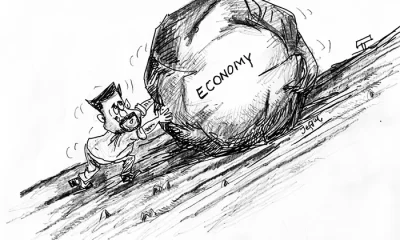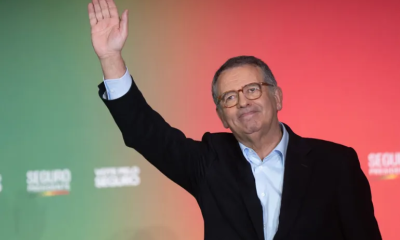Editorial
Let them be helped

Monday 28th February, 2022
More than 4,000 Ukrainian tourists have been stranded here due to the raging war in their country. They obviously did not bargain for a full-blown military conflict at home when they came here. Now, they are up a creek with their funds running out; they have no way of receiving money from Ukraine, which is in turmoil. Some of them have appealed for shelter. Sri Lanka is duty bound to look after these men, women and children in trouble. Ukrainians have helped revive Sri Lanka’s tourism by coming here in their numbers. They must not be let down in the hour of their need.
It never rains but it pours, as they say. The war in Ukraine could hardly have come at a worse time for Sri Lanka’s tourism industry, which has been clambering out of the dark abyss the pandemic plunged it into, about two years ago. Most tourists who visit Sri Lanka are Russians and Ukrainians, and the worsening conflict in Ukraine is bound to take its toll on the tourism industry as well as most other sectors here. Some tourist hotels, guest houses, etc., where the stranded Ukrainians are staying have offered to help their hapless guests, but they themselves are in dire financial straits and cannot go on doing so for a long time. A state intervention is therefore called for.
Former Sri Lankan Ambassador to Ukraine Udayanga Weeratunga has met the stranded Ukrainians and reassured them. This kind reassurance is welcome, but much more needs to be done; it must be turned into tangible support if it is to be of any use. Nothing is so freely given as assurances.
Arrangements must be made to accommodate the stranded Ukrainian tourists, and look after them until the situation improves in their country for them to return. Chances are that fighting will last several months unless a neutral country manages to broker a ceasefire, which is the need of the hour. One cannot but hope and pray that sanity will prevail and both sides to the Ukrainian conflict will make compromises and avoid further escalation of violence. The US and its NATO allies fuelling the flames from a safe distance must stop compassing their sinister ends at the expense of Ukraine.
Tourism Minister Prasanna Ranatunga has announced that the government will allocate as much as USD 56 million for an advertising campaign to promote Sri Lanka’s tourism industry. We argued in a previous column that scarce foreign exchange should be better utilised, and there were more important needs than a promotion campaign where the development of tourism was concerned. Let the government be urged to put the expensive promotion drive on hold, and utilise some of the funds allocated for it to look after the stranded Ukrainians. Besides being a noble humanitarian gesture, such help will be the most effective way of promoting Sri Lanka’s tourism; the world will know Sri Lanka cares for its guests and does not leave them in the lurch. Could anyone think of a better way to advertise Sri Lanka’s tourism industry?
Meanwhile, Sri Lanka may be able to enlist the support of the Colombo-based foreign missions that represent the NATO members to look after the Ukrainians stranded here. NATO is weeping buckets for the displaced Ukrainians, having provoked Russia by trying to expand itself up to the Russian border through Ukraine. The western embassies will respond positively to a call for helping the Ukrainians in need if they genuinely feel for the victims of war. The UN, which has become a metaphor for impotency as well as hypocrisy, is also duty bound to look after those affected by the ongoing war. If it cannot prevent or stop wars, it must at least take care of their victims. That is the least it could do to justify its existence.
Editorial
Big Brother coming?

There is already a substantial and growing corpus of analytical work criticising the proposed anti-terror laws, which are no less draconian than the PTA (Prevention of Terrorism Act) they are expected to replace. What the campaigners for democracy and good governance expected of the JVP-led NPP was the abolition of the PTA and not another set of bad laws in its place.
Unsurprisingly, many legal experts have voiced serious concern over the proposed Protection of the State from Terrorism Act (PSTA). Prominent among them is former Minister of Justice, Constitutional Affairs, and Foreign Affairs Prof. G. L. Peiris, who presented a well-argued critique of the proposed anti-terror legislation, at a media briefing on Thursday. He and some other senior Opposition politicians called the PSTA a grave danger to democracy. Anyone who has studied the proposed anti-terror laws will have no difficulty in agreeing with him and other critics of the PSTA.
One of the main campaign promises of the JVP-led NPP was to abolish the executive presidency. During their opposition days, President Anura Kumara Dissanayake and other JVP/NPP seniors were instrumental in having the powers of the Executive President reduced through the 17th, 19th and 21st Amendments to the Constitution. They also vehemently condemned the PTA, demanding its abolition. Now, an opportunity has presented itself for the JVP/NPP leaders to carry out what they wanted their predecessors to do—abolition of the executive presidency and the PTA. But they are soft-pedalling the dictatorial powers vested in the executive presidency and trying every trick in the book to retain the PTA in the form of the PSTA. If the proposed anti-terror laws are ratified—perish the thought—President Dissanayake will have more dictatorial powers including the one to ban any organisation simply by issuing a gazette notification to that effect. What guarantee is there that the government will not abuse that power to ban political parties the way President J. R. Jayewardene did; he proscribed the JVP in the early 1980s by falsely accusing it of being involved in anti-Tamil violence. The JVP stands accused of working towards the establishment of a one-party system. There is hardly anything an outfit like the JVP will not do to retain its hold on power.
Another serious issue Prof. Peiris has rightly flagged is that the PSTA seeks to empower the Defence Secretary to issue detention orders to have suspects in judicial custody transferred to police custody. Thus, the JVP, whose leader—President Dissanayake—appoints the Defence Secretary and has the police under its thumb, will be in a position to circumvent the judicial process and have anyone detained for a maximum of one year.
Pointing out that the proposed PSTA has categorised 13 offences as acts of terrorism although they can be dealt with under other laws, Prof. Peiris has argued that the PSTA is riddled with ambiguities. This, he has said, blurs the critical distinction between ordinary criminal offences and acts of terrorism, which require “clear and unambiguous definition with no scope for elasticity of interpretation.” Grey areas in any legislation are minefields; they lend themselves to misuse, if not abuse, and therefore must be eliminated in the name of democracy and the people’s rights and liberties.
Another danger in the proposed PSTA is the sweeping powers to be vested in the Defence Secretary, a political appointee, including the one to designate ‘prohibited areas’, Prof. Peiris has revealed. Entering such places will constitute an offence punishable by imprisonment up to three years and a fine of up to Rs. 3 million. One cannot but agree that such provision will have a chilling effect on media personnel as they will be prohibited from photographing, video recording and sketching or drawing them.
The deplorable manner in which the JVP/NPP is trying to safeguard the interests of the incumbent dispensation on the pretext of protecting the state against terror makes one hope and pray that Sri Lanka will not end up being like Oceania in Orwell’s Nineteen Eighty-Four, with Big Brother watching every citizen menacingly. Pressure must be brought to bear on the government to deep-six its PSTA forthwith.
Editorial
When Prez has to do others’ work

Saturday 14th February, 2026
A nine-day protest by beach seine fishers against a ban on the use of tractor-mounted winches to haul their nets was called off yesterday following a discussion with President Anura Kumara Dissanayake. The protesting fisherfolk had been demanding a meeting with the President, but in vain. Why did the President wait for nine days to invite them to a discussion? He could have stepped in to have the fishers’ protest called off on the first day of agitation itself.
Governments usually do not agree to negotiate with any protesters immediately after the launch of their agitations lest others should be encouraged to do likewise. Politicians in power seek to wear down protesters by resorting to brinkmanship. They consider it infra dig to blink first, so to speak. This is the name of the game, but governments and the public stand to gain when the issues that lead to protests and strikes are resolved promptly.
Minister of Fisheries Ramalingam Chandrasekar and his deputy Ratna Gamage opted to play a game of chicken with the protesting fishers, refusing to soften their position that the ban on ‘mechanised’ beach seine fishing must continue. They declared that the ban at issue was non-negotiable, provoking the fishermen into intensifying their protest. They should have invited the protesters to the negotiating table.
There are two schools of thought about the use of tractors fitted with winches to drag fishing nets. Environmentalists are of the view that the use of winches to haul nets causes serious environmental issues, such as the destruction of coral reefs. Those who practise this fishing method argue that there are no corals in the areas where they practise beach seine fishing, and they avoid reefs, which damage their nets. Tractors do not cause sea erosion, they insist. Daring the government to prove scientifically that the homegrown method of hauling nets causes environmental damage, they demanded that they be allowed to use tractors and winches pending an investigation. Why the government did not adopt the proposed course of action is the question. It should have taken up the fishermen’s challenge.
Cabinet Ministers and top bureaucrats rarely succeed in resolving labour disputes under their own steam. They only confront strikers or protesters, provoking the latter into escalating their trade union action, much to the inconvenience of the public. The President has to intervene to do the work of ministers and ministry secretaries and resolve labour issues. This has been the situation under successive governments.
One of the main arguments against the executive presidency is that the President tends to run a one man/woman show, undermining the Cabinet and the state service. Unbridled powers vested in the President have been blamed for this situation, which however is also due to the failure of Cabinet Ministers and top bureaucrats to carry out their duties and functions effectively.
If ministers cannot tackle serious issues without presidential interventions, which are frequent, why should the public pay through the nose to maintain a Cabinet of Ministers?
Editorial
A welcome judgement

Friday 13th February, 2026
Justice has caught up with those who killed SLPP MP Amarakeerthi Athukorale and his security officer. The Gampaha High Court has sentenced 12 convicts to death for the double murder they committed during the 2022 uprising, popularly known as Aragalaya. This judgement has evoked the dreadful memories of the crimes committed in the name of a people’s protest movement about four years ago.
Aragalaya began as an outpouring of public resentment fuelled by the 2022 economic crisis and the resultant shortages of essentials. It developed into what may be described as a carnival of protests at Galle Face, where a motley crowd of activists championing various causes gathered under the ‘Gota Go Home’ banner. It was subsequently hijacked by some ultra-radical political forces with sinister agendas following an SLPP goon attack on the Galle Face protesters in May 2022. Retaliatory attacks carried out by organised groups among protesters turned Aragalaya into a firenado of violence that swept through many parts of the country. It was during that violent phase of Aragalaya that mobs killed MP Athukorale and his security officer and torched scores of houses belonging to SLPP politicians and their cronies. All SLPP MPs would have suffered the same fate as Athukorale if they had not gone into hiding. The destructive forces responsible for committing crimes in the name of Aragalaya must be brought to justice.
The genuine Aragalaya activists who acted as a pressure group, calling for an end to the Rajapaksa rule, wanted to call off their protest campaign following the resignation of President Gotabaya Rajapaksa; their goal was to see the back of Gotabaya as evident from the catchy hashtag, “GotaGoHome”. But some opportunistic political forces, particularly the JVP, sought to use Aragalaya to capture Parliament. Minister K. D. Lalkantha himself has admitted that the JVP strove to lead the Aragalaya activists to Parliament, but without success. JVP leaders are seen in social media videos urging the people to rush to Colombo and march on Parliament and deliver a coup de grace to a teetering system. If the military had not made a decisive intervention at the eleventh hour, using force, aggressive mobs that surged forward menacingly, pulling down barricades, would have captured Parliament and perhaps set it on fire, plunging the country into anarchy. One may recall that a grenade attack on a UNP parliamentary group meeting chaired by President J. R. Jayewardene, with Prime Minister R. Premadasa seated next to him in 1987 almost made the country descend into anarchy. That bomb attack, which left a minister and a public official dead and 16 others injured, was blamed on the JVP.
A former senior Indian police officer discusses grey-zone warfare in an article we have reproduced today from The Statesman, an Asia News Network member. This doctrine of hybrid conflict has gained currency in diplomatic, defence and intelligence circles the world over. What we witnessed during the final phase of Aragalaya (2022) can be dubbed ‘grey-zone terrorism’. Arson attacks on the houses of prominent SLPP politicians and others were well organised; they could not have been carried out by flash mobs consisting of non-violent protesters. Unfortunately, those crimes have not been probed properly. The then SLPP-UNP government was wary of investigating those serious transgressions; instead, it generously awarded compensation to the victims of arson attacks far in excess of their losses. The incumbent administration has rightly instituted legal action against some of the culprits who helped themselves to public funds by playing the victim card and inflating estimates, but most of the arsonists and the masterminds behind the arson attacks have got off scot-free. They must be traced and made to face the full force of the law.
The welcome judgement in the Athukorale murder case offers a lesson that should not go unlearnt. Those who join mobs and commit crimes must remember that they run the risk of being tried and thrown behind bars. On seeing the instigators of violence during Aragalaya savouring power and going places, the killers of Athukorale and his body guard must be ruing the day they committed that crime.
-

 Business4 days ago
Business4 days agoAutodoc 360 relocates to reinforce commitment to premium auto care
-

 Midweek Review4 days ago
Midweek Review4 days agoA question of national pride
-

 Opinion3 days ago
Opinion3 days agoWill computers ever be intelligent?
-

 Midweek Review4 days ago
Midweek Review4 days agoTheatre and Anthropocentrism in the age of Climate Emergency
-

 Editorial6 days ago
Editorial6 days agoThe JRJ syndrome
-

 Opinion4 days ago
Opinion4 days agoThe Walk for Peace in America a Sri Lankan initiative: A startling truth hidden by govt.
-

 Opinion5 days ago
Opinion5 days agoBeyond 4–5% recovery: Why Sri Lanka needs a real growth strategy
-

 Foreign News6 days ago
Foreign News6 days agoPortugal elects Socialist Party’s Seguro as president in landslide













